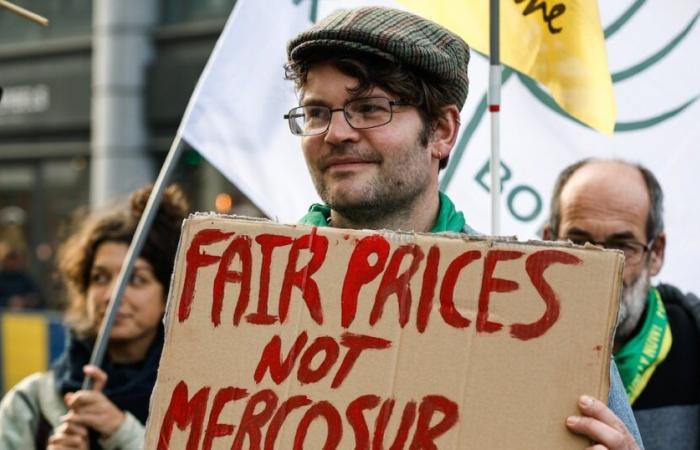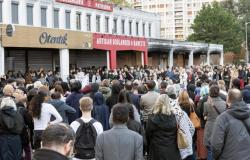Act II of the demonstrations of peasant anger began in France this Monday, November 18. In Cannet-des-Maures in the Var, some 300 farmers placed earth on the road and planted crosses symbolizing the death of French agriculture, which they consider threatened by the free trade agreement between European Union and the Latin American countries of Mercosur. Around 80 symbolic actions of this kind are being carried out by the majority union alliance FNSEA-JA in the territory, a prelude to a new cycle of mobilization which could prove to be as eventful as the one which shook France last February against a backdrop of crisis general in agriculture. Negotiated for 25 years by the EU, this agreement could be ratified by December, and trigger a cold war between Paris and Berlin.
Throughout the major producing countries, agricultural organizations are also denouncing the draft agreement. There is great concern about agricultural products exported from South America – such as beef, poultry, pork, honey or sugar. According to farmers, these imports to the EU would create conditions of competition deemed unfair, these foodstuffs not meeting the same environmental and social standards as in Europe, or even health standards in the event of poor controls.
READ ALSO: EU-Mercosur Treaty: behind a criticized agreement, these figures which show the importance of the stakes
But the response from European governments is more nuanced. To succeed in blocking the agreement, France must rally at least four member states representing more than 35% of the European population. For several weeks, France has been “trying to form a veto minority”, explained this Monday the Minister of Agriculture Annie Genevard, on France Bleu Besançon. “There is intense diplomatic work being done today to bring together a certain number of European countries,” added the minister, referring in particular to Poland and Austria.
- Poland and Austria support France
The Polish Ministry of Agriculture thus expressed its “serious reservations” with regard to a project which “will perhaps have some benefits for industry, maritime transport and certain services, at the expense of most segments of agri-food production. One of the main agricultural organizations, NSZZ RI Solidarność, called on the head of government Donald Tusk to go further and “block” the project.
On the same line, “in Austria, all parliamentary parties, with the exception of the Neos, are against the agreement”, states the national newspaper The press. The parliamentarians of the Austrian National Council have also adopted a resolution against, recalls the Ministry of Agriculture: “restricting agricultural production in Europe via ever more severe standards while pushing for old-school trade agreements, this does not is not compatible. Austria is an export-oriented country, we want the game to be fair,” they said. Such imports without customs duties “put our agriculture at risk”, also summarizes the country's first agricultural association, Bauernbund.
READ ALSO: EU-Mercosur, the agreement that ignites the French countryside: manipulations, standoffs and threats
- Mercosur, an economic opportunity for Germany
On the other hand, heavyweights like Germany and Spain are pushing the European Commission to finalize the agreement by the end of the year, in the hope of reviving European growth, supported by the Portugal.
Germany, reluctant to accept the agreement under Angela Merkel due to deforestation in the Amazon, thus changed positions with Olaf Scholz, wishing to expand its industrial outlets. “This free trade agreement would be a liberating blow for the German economy. We must seize this opportunity, it is difficult to imagine a more difficult situation geopolitically,” said Volker Treier, head of foreign trade at the German Chamber of Commerce and Industry to German media The wave. Adding that “the election of Donald Trump must also be a wake-up call to keep us ready to compromise.”
For the German Farmers' Association (DBV), the main union, “it is urgent to renegotiate” this agreement. No official demonstration is planned, which should not prevent convergences on the Franco-German border, as on the Franco-Spanish border.
- Spain fears the geopolitical context after the election of Trump
In Spain too, the government of socialist Prime Minister Pedro Sánchez has spoken out in favor of ratifying the agreement. The head of the Spanish government also assured at the end of last month that Europe is “very close to concluding this agreement”, during an economic forum in the Portuguese city of Faro, reports the Argentine newspaper le Buenos Aires Times.
It is “strategically necessary”, also assured the Minister of Agriculture Luis Planas in mid-October: sectors could suffer, like the beef sector, but others benefit from it, like wine and olive oil. This Monday, November 18, the minister once again defended “the importance of the European Union (EU) for the signing of its trade agreement with Mercosur in the current geopolitical context and, in particular, after the victory of Donald Trump in the United States”, reports the Spanish channel ABC. No mobilization has been announced, but all the major Spanish agricultural unions have expressed their fears, particularly for livestock farming.
READ ALSO: Farmers: why anger is brewing again in the countryside
- Italy falters and could change the situation
Italy could have fallen into the opposition camp this Monday, November 18. Italian Agriculture Minister Francesco Lollobrigida spoke out in a statement against the project in its current form. “We must check in advance the respect by the Mercosur countries of the same obligations that we impose on our farmers in terms of respect for workers' rights and the environment,” justified this minister who is a member of Fratelli d'Italia, the party of far right led by Giorgia Meloni of whom he is close. Foreign Minister Antonio Tajani, head of the conservative Forza Italia party, a member of the ruling coalition, was more open. “These are very complex negotiations,” he judged in early October in an interview with CNN Brazil, nevertheless deeming it “possible” to reach an agreement “useful for both parties”.
Major Italian organization Coldiretti recently wrote to Prime Minister Giorgia Meloni to express “deep concern” about a deal that “would have devastating effects on the agri-food sector”. The latter should come to Buenos Aires on November 20, after the visit of Emmanuel Macron who met the ultraliberal Argentine President Javier Milei on November 17 to explain the French opposition to him.
READ ALSO: How Italy became the fourth largest exporter in the world: these recipes that could inspire France
- Netherlands, Ireland… The uncertain
On the Dutch side, the four parties in the government coalition remain divided on the subject. The main agricultural union LTO is calling for “stopping negotiations”, considering that the poultry and sugar sectors would be threatened. “The agreement could however be good for the cheese sector, be an opportunity for horticulture, but these are relatively small sums”, nuance LTO.
While in Ireland the legislative elections at the end of November are focusing attention, the representatives of the breeders (ICSA) protested in front of the lower house of Parliament. The Irish government has so far taken an ambiguous position on the deal: “not rejecting the deal outright, Fianna Fáil leader Micheál Martin said the Mercosur deal in its current form was unacceptable to the 'Ireland', points out Irish pure-player Gript.






